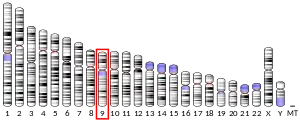| AQP7 | |||||||||||||||||||||||||||||||||||||||||||||||||||
|---|---|---|---|---|---|---|---|---|---|---|---|---|---|---|---|---|---|---|---|---|---|---|---|---|---|---|---|---|---|---|---|---|---|---|---|---|---|---|---|---|---|---|---|---|---|---|---|---|---|---|---|
| Identifiers | |||||||||||||||||||||||||||||||||||||||||||||||||||
| Aliases | AQP7, AQP7L, AQP9, AQPap, GLYCQTL, aquaporin 7 | ||||||||||||||||||||||||||||||||||||||||||||||||||
| External IDs | OMIM: 602974 MGI: 1314647 HomoloGene: 48000 GeneCards: AQP7 | ||||||||||||||||||||||||||||||||||||||||||||||||||
| |||||||||||||||||||||||||||||||||||||||||||||||||||
| |||||||||||||||||||||||||||||||||||||||||||||||||||
| |||||||||||||||||||||||||||||||||||||||||||||||||||
| |||||||||||||||||||||||||||||||||||||||||||||||||||
| |||||||||||||||||||||||||||||||||||||||||||||||||||
| Wikidata | |||||||||||||||||||||||||||||||||||||||||||||||||||
| |||||||||||||||||||||||||||||||||||||||||||||||||||
Aquaporin-7 (AQP-7) is a protein that in humans is encoded by the AQP7 gene.[5][6]
Aquaporins/major intrinsic proteins (MIP) are a family of water-selective membrane channels. Aquaporin-7 has greater sequence similarity with AQP3 and AQP9 and they may be a subfamily. Aquaporin-7 and AQP3 are at the same chromosomal location suggesting that 9p13 may be a site of an aquaporin cluster. Aquaporin-7 facilitates water, glycerol and urea transport. It may play an important role in thermoregulation in the form of perspiration, and sperm function.[6]
References
- 1 2 3 GRCh38: Ensembl release 89: ENSG00000165269 - Ensembl, May 2017
- 1 2 3 GRCm38: Ensembl release 89: ENSMUSG00000028427 - Ensembl, May 2017
- ↑ "Human PubMed Reference:". National Center for Biotechnology Information, U.S. National Library of Medicine.
- ↑ "Mouse PubMed Reference:". National Center for Biotechnology Information, U.S. National Library of Medicine.
- ↑ Ishibashi K, Kuwahara M, Gu Y, Kageyama Y, Tohsaka A, Suzuki F, Marumo F, Sasaki S (Sep 1997). "Cloning and functional expression of a new water channel abundantly expressed in the testis permeable to water, glycerol, and urea". J Biol Chem. 272 (33): 20782–6. doi:10.1074/jbc.272.33.20782. PMID 9252401.
- 1 2 "Entrez Gene: AQP7 aquaporin 7".
Further reading
- Dibas AI, Mia AJ, Yorio T (1998). "Aquaporins (water channels): role in vasopressin-activated water transport". Proc. Soc. Exp. Biol. Med. 219 (3): 183–99. doi:10.3181/00379727-219-44332. PMID 9824541. S2CID 28952956.
- Kuriyama H, Kawamoto S, Ishida N, et al. (1998). "Molecular cloning and expression of a novel human aquaporin from adipose tissue with glycerol permeability". Biochem. Biophys. Res. Commun. 241 (1): 53–8. doi:10.1006/bbrc.1997.7769. PMID 9405233.
- Ishibashi K, Yamauchi K, Kageyama Y, et al. (1998). "Molecular characterization of human Aquaporin-7 gene and its chromosomal mapping". Biochim. Biophys. Acta. 1399 (1): 62–6. doi:10.1016/s0167-4781(98)00094-3. PMID 9714739.
- Suzuki-Toyota F, Ishibashi K, Yuasa S (1999). "Immunohistochemical localization of a water channel, aquaporin 7 (AQP7), in the rat testis". Cell Tissue Res. 295 (2): 279–85. doi:10.1007/s004410051234. PMID 9931374. S2CID 30916397.
- Kondo H, Shimomura I, Kishida K, et al. (2002). "Human aquaporin adipose (AQPap) gene. Genomic structure, promoter analysis and functional mutation". Eur. J. Biochem. 269 (7): 1814–26. doi:10.1046/j.1432-1033.2002.02821.x. PMID 11952783.
- Strausberg RL, Feingold EA, Grouse LH, et al. (2003). "Generation and initial analysis of more than 15,000 full-length human and mouse cDNA sequences". Proc. Natl. Acad. Sci. U.S.A. 99 (26): 16899–903. Bibcode:2002PNAS...9916899M. doi:10.1073/pnas.242603899. PMC 139241. PMID 12477932.
- Ota T, Suzuki Y, Nishikawa T, et al. (2004). "Complete sequencing and characterization of 21,243 full-length human cDNAs". Nat. Genet. 36 (1): 40–5. doi:10.1038/ng1285. PMID 14702039.
- Humphray SJ, Oliver K, Hunt AR, et al. (2004). "DNA sequence and analysis of human chromosome 9". Nature. 429 (6990): 369–74. Bibcode:2004Natur.429..369H. doi:10.1038/nature02465. PMC 2734081. PMID 15164053.
- Fortna A, Kim Y, MacLaren E, et al. (2006). "Lineage-Specific Gene Duplication and Loss in Human and Great Ape Evolution". PLOS Biol. 2 (7): E207. doi:10.1371/journal.pbio.0020207. PMC 449870. PMID 15252450.
- Marrades MP, Milagro FI, Martínez JA, Moreno-Aliaga MJ (2006). "Differential expression of aquaporin 7 in adipose tissue of lean and obese high fat consumers". Biochem. Biophys. Res. Commun. 339 (3): 785–9. doi:10.1016/j.bbrc.2005.11.080. PMID 16325777.
- Prudente S, Flex E, Morini E, et al. (2007). "A functional variant of the adipocyte glycerol channel aquaporin 7 gene is associated with obesity and related metabolic abnormalities". Diabetes. 56 (5): 1468–74. doi:10.2337/db06-1389. PMID 17351148.
- Ceperuelo-Mallafré V, Miranda M, Chacón MR, et al. (2007). "Adipose tissue expression of the glycerol channel aquaporin-7 gene is altered in severe obesity but not in type 2 diabetes". J. Clin. Endocrinol. Metab. 92 (9): 3640–5. doi:10.1210/jc.2007-0531. PMID 17566090.
External links
- AQP7+protein,+human at the U.S. National Library of Medicine Medical Subject Headings (MeSH)
- Human AQP7 genome location and AQP7 gene details page in the UCSC Genome Browser.
- Human AQP9 genome location and AQP9 gene details page in the UCSC Genome Browser.
This article incorporates text from the United States National Library of Medicine, which is in the public domain.
This article is issued from Wikipedia. The text is licensed under Creative Commons - Attribution - Sharealike. Additional terms may apply for the media files.




